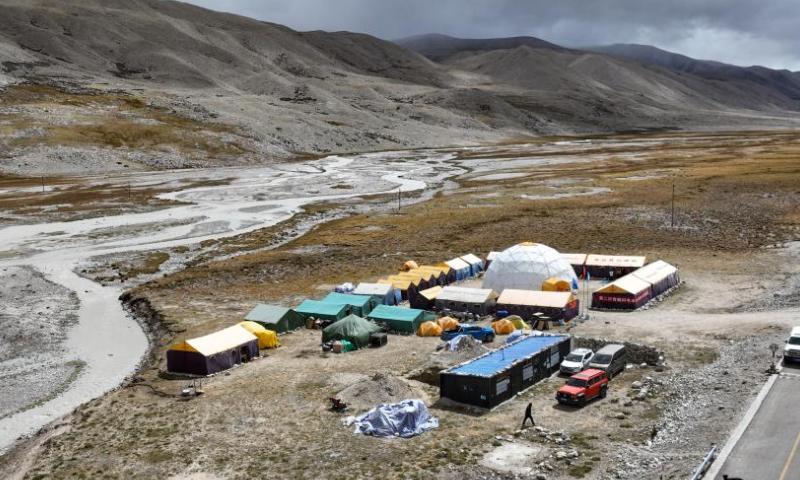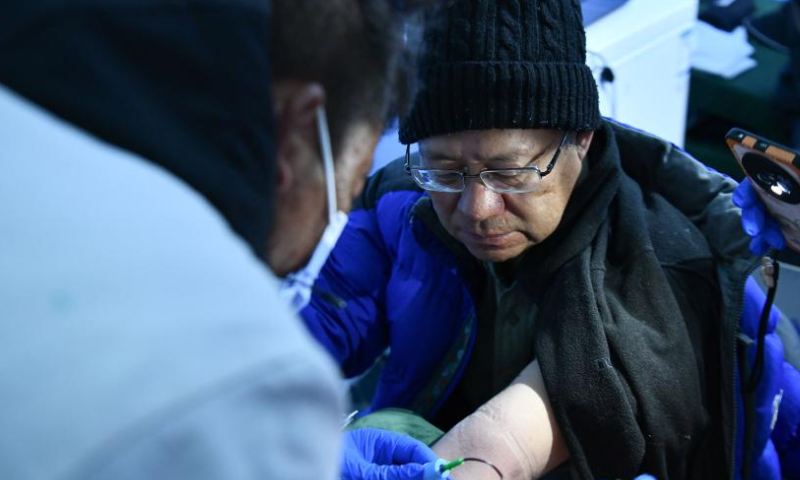
This aerial photo taken on Oct. 1, 2023 shows the Mount Cho Oyu base camp. In the 4,950-meter-high base camp at the foot of Mount Cho Oyu, the sixth-highest mountain in the world with an altitude of 8,201 meters, Chinese research team has recently conducted an experiment on the group who rushed into the plateau region to reveal more about the interaction between a high-altitude environment and people new to it. The team collected blood, urine, saliva, feces and other samples, measured blood pressure, and monitored the pulse wave velocity of the volunteers to provide samples for follow-up research efforts. The 2023 Mount Cho Oyu expedition is part of the second comprehensive scientific expedition to the Qinghai-Tibet Plateau initiated in 2017. (Xinhua/Jigme Dorje)

Zhu Tong, an academician with the Chinese Academy of Sciences, gets his blood collected for research at the Mount Cho Oyu base camp on Oct. 1, 2023. In the 4,950-meter-high base camp at the foot of Mount Cho Oyu, the sixth-highest mountain in the world with an altitude of 8,201 meters, Chinese research team has recently conducted an experiment on the group who rushed into the plateau region to reveal more about the interaction between a high-altitude environment and people new to it. The team collected blood, urine, saliva, feces and other samples, measured blood pressure, and monitored the pulse wave velocity of the volunteers to provide samples for follow-up research efforts. The 2023 Mount Cho Oyu expedition is part of the second comprehensive scientific expedition to the Qinghai-Tibet Plateau initiated in 2017. (Xinhua/Jigme Dorje)

Zhu Tong, an academician with the Chinese Academy of Sciences, conducts a test at the Mount Cho Oyu base camp on Oct. 1, 2023. In the 4,950-meter-high base camp at the foot of Mount Cho Oyu, the sixth-highest mountain in the world with an altitude of 8,201 meters, Chinese research team has recently conducted an experiment on the group who rushed into the plateau region to reveal more about the interaction between a high-altitude environment and people new to it. The team collected blood, urine, saliva, feces and other samples, measured blood pressure, and monitored the pulse wave velocity of the volunteers to provide samples for follow-up research efforts. The 2023 Mount Cho Oyu expedition is part of the second comprehensive scientific expedition to the Qinghai-Tibet Plateau initiated in 2017. (Xinhua/Jigme Dorje)

Zhu Tong, an academician with the Chinese Academy of Sciences, conducts a test at the Mount Cho Oyu base camp on Oct. 1, 2023. In the 4,950-meter-high base camp at the foot of Mount Cho Oyu, the sixth-highest mountain in the world with an altitude of 8,201 meters, Chinese research team has recently conducted an experiment on the group who rushed into the plateau region to reveal more about the interaction between a high-altitude environment and people new to it. The team collected blood, urine, saliva, feces and other samples, measured blood pressure, and monitored the pulse wave velocity of the volunteers to provide samples for follow-up research efforts. The 2023 Mount Cho Oyu expedition is part of the second comprehensive scientific expedition to the Qinghai-Tibet Plateau initiated in 2017. (Xinhua/Jigme Dorje)
In the 4,950-meter-high base camp at the foot of Mount Cho Oyu, the sixth-highest mountain in the world with an altitude of 8,201 meters, Zhu Tong, an academician with the Chinese Academy of Sciences, conducted a reactivity test.
The academician wore a helmet connected to a computer, the screen of which occasionally featured words describing colors such as "red," "yellow" or "green," but in a different color to the meaning of the word. When meeting the word "red" displayed in blue, he chose the correct color of blue instead of the meaning of the word, so as to test his reactivity.
"I happen to be one of those who rushed into the plateau region," said Zhu, who was conducting an experiment on the group to reveal more about the interaction between a high-altitude environment and people new to it.
People from low-altitude areas, after they enter a plateau area very quickly, are exposed to unfamiliar low-pressure and hypoxic environments, and can be easily affected by acute high-altitude diseases such as pulmonary edema.
Zhu's team had previously monitored the health conditions of people approaching Mount Qomolangma, the world's highest peak, at altitudes of 5,200, 5,800, 6,350 and 8,848 meters, while the team this time tested more categories, such as reactivity, at more altitudes on Mount Cho Oyu to collect additional data.
"As you rise in altitude, your body will change accordingly, which makes this intuitive data valuable," said 60-year-old Zhu.
The team collected blood, urine, saliva, feces and other samples, measured blood pressure, and monitored the pulse wave velocity of the volunteers, including Zhu himself, to provide samples for follow-up research efforts.
The 2023 Mount Cho Oyu expedition is part of the second comprehensive scientific expedition to the Qinghai-Tibet Plateau initiated in 2017.
"We are still collecting and organizing the data," said Zhu. "Many results from the expedition will hopefully provide useful prevention and protection measures for short-term visitors to high-altitude areas."
